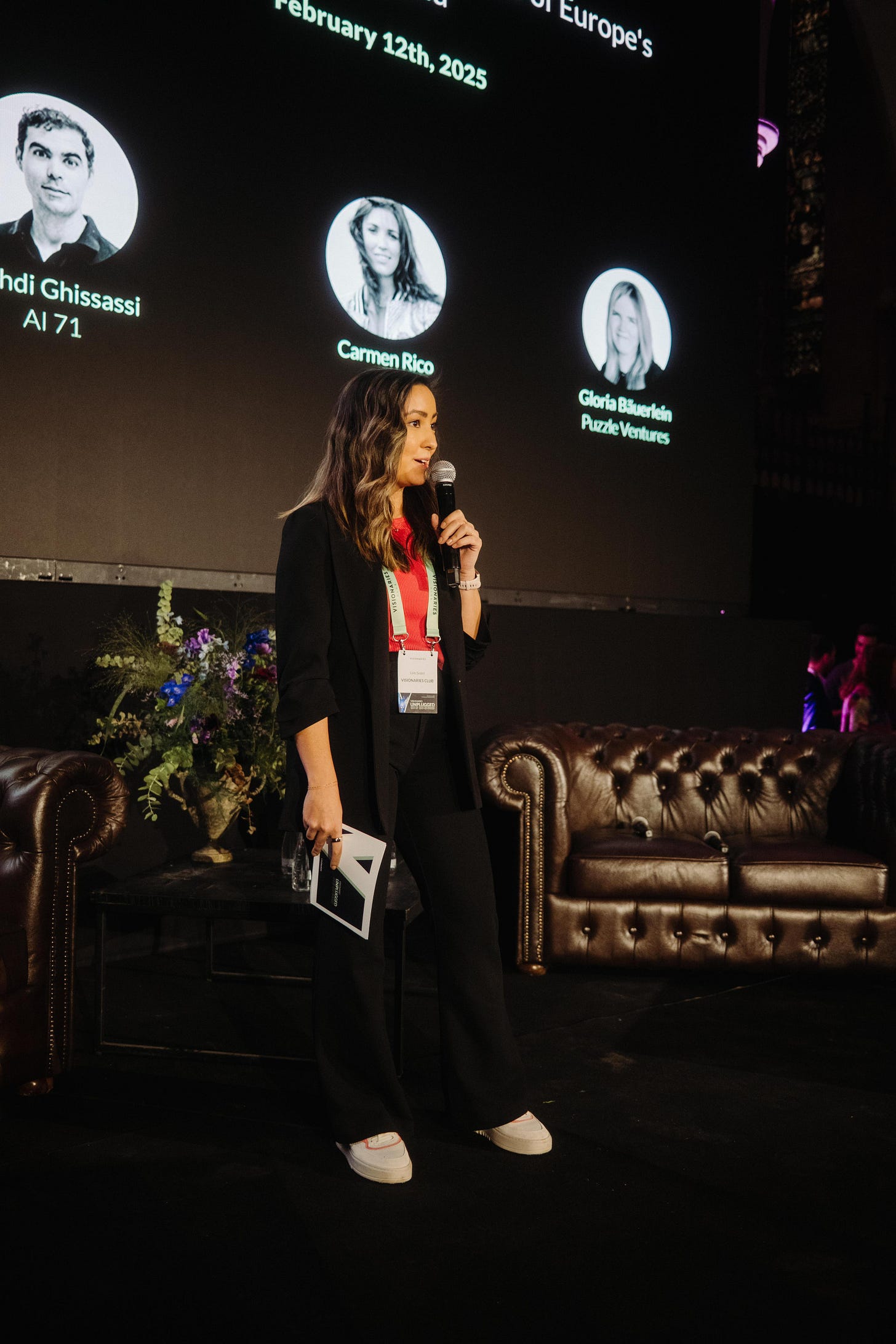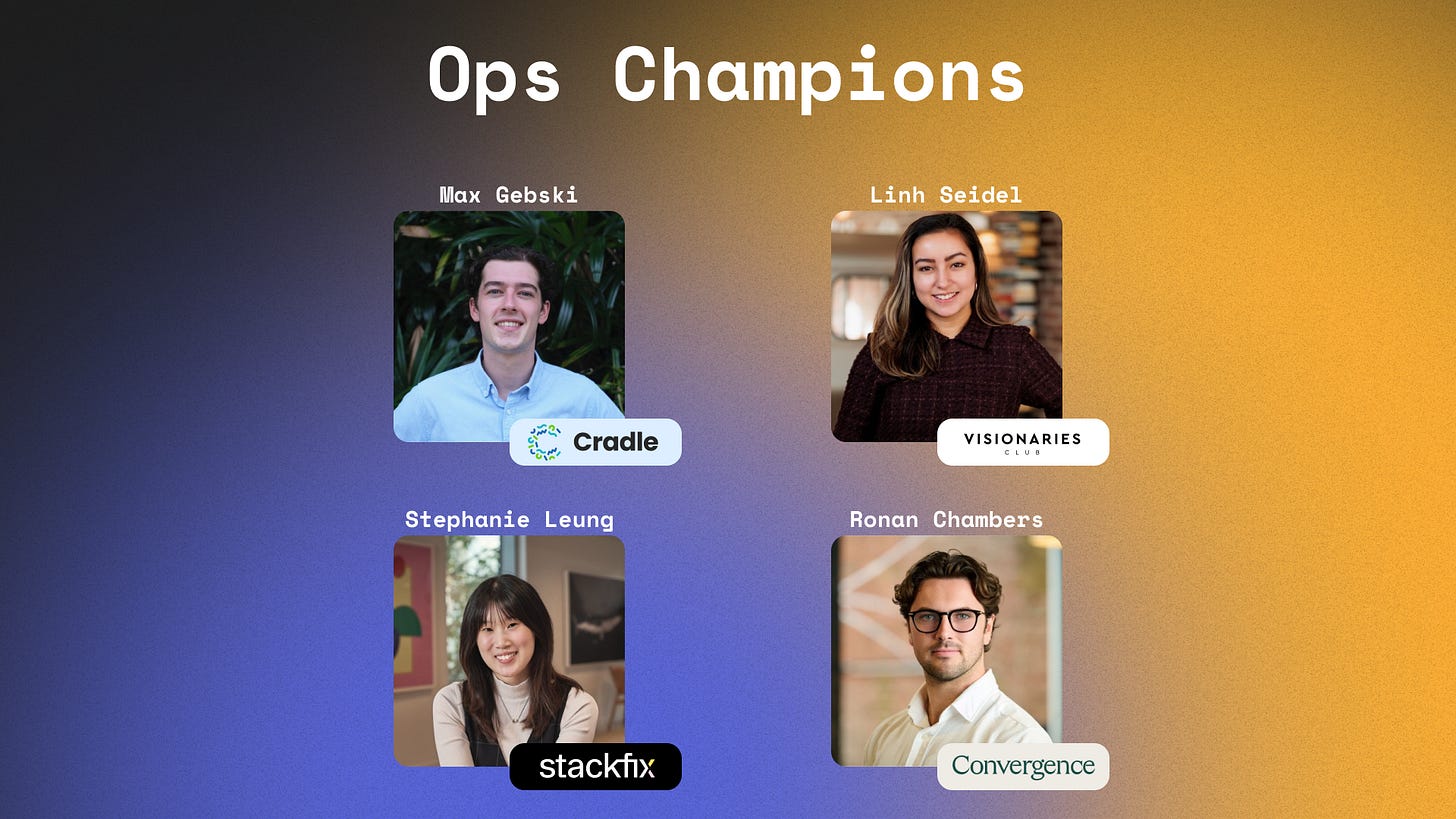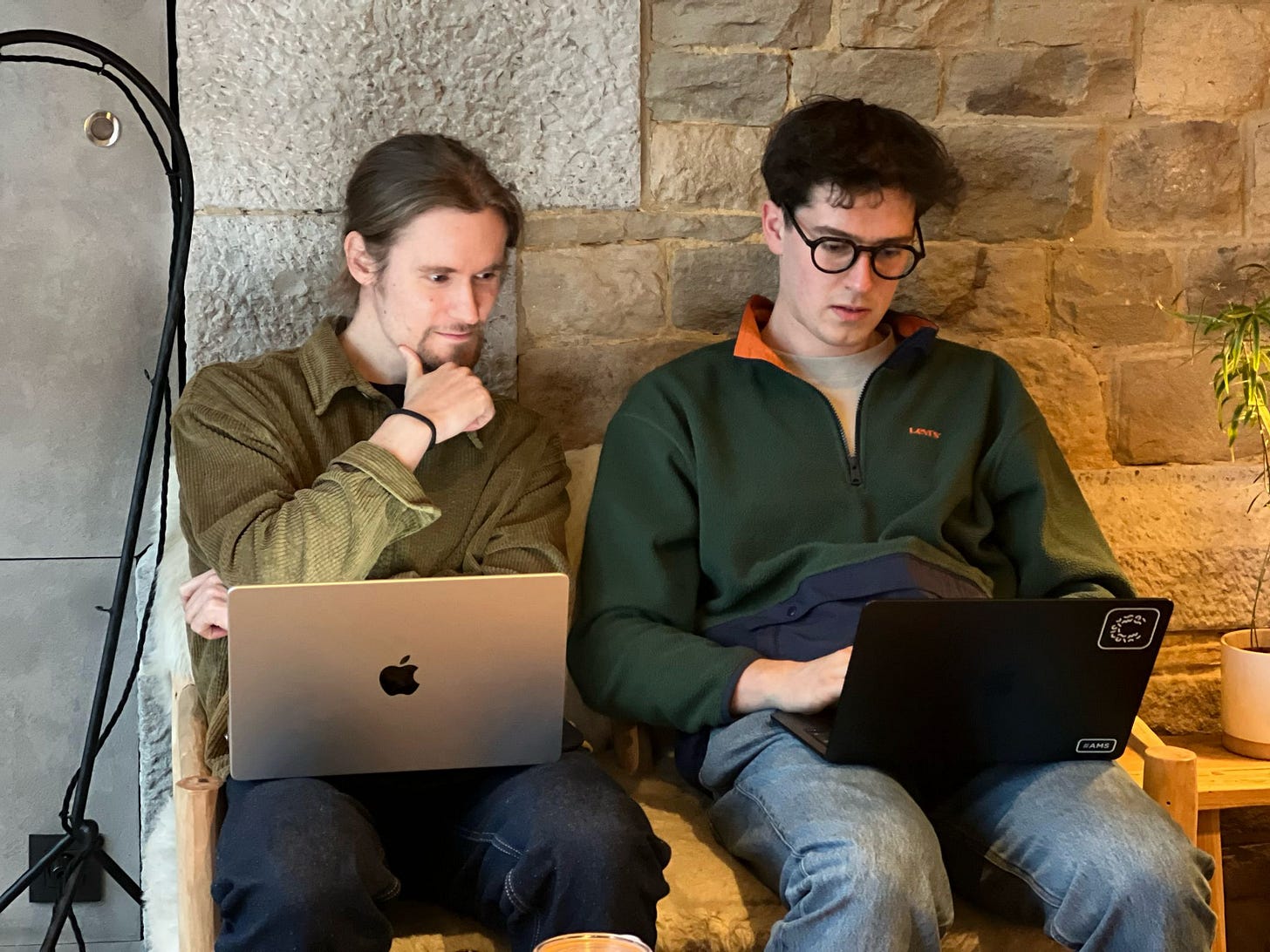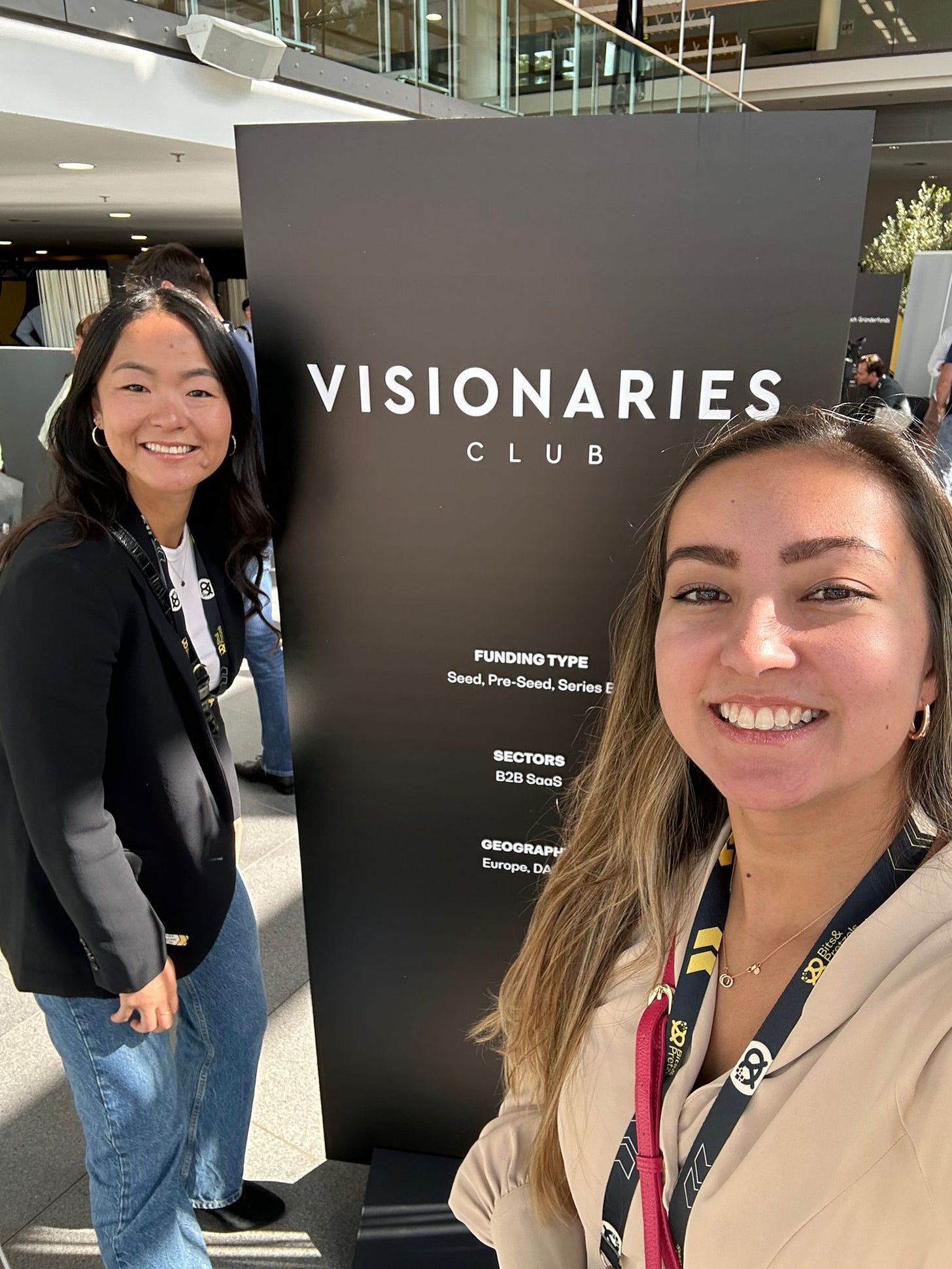For this next interview post I wanted to do something different. I wanted to make it more about abstract topics, ways of thinking, ways of working and how to make a startup work. Naturally, the topic of operations came to mind.
In short, Operations simultaneously manages the mundane (taxes, office supplies) and mission-critical (cash-burn, hiring pipelines). They’re kind of like a backstage crew.
I reached out to 4 operations champions to learn more about this role and how to be successful in it, across different stages and different industries. Get the inside scoop on everything from their daily grind, how they bring order to chaos, the metrics they swear by and their secrets for prioritisation. We discussed when it’s time to automate a process, their go-to tools, and how they track their own growth. And to wrap it up, we took a look ahead at how the role of operations might change in the years to come.
Let me introduce you to:
Ronan Chambers, Founding Ops at Convergence (raised $12m from Balderton, Salesforce Ventures & Shopify Ventures). Convergence creating personal AI agents for everyone. I’ve tried it myself and their template marketplace it impressive.
Stephanie Leung, Ops & Product at Stackfix (raised $3m from Chalfen Ventures, Seedcamp, helloworld, and angels). Stackfix makes AI test and review software instead of humans. This is my go-to website to compare tooling, from CRM systems to notetakers to product analytics.
Max Gebski, Ops at Cradle (raised $102m from Index Ventures, Kindred Capital, IVP and angels). Cradle’s design platform uses generative AI to help biologists design improved proteins and accelerate research and development. One of the hottest, most promising and most impactful companies in Europe.
Linh Seidel, Head of Platform Ops at Visionaries Club (European B2B-focused early-stage fund, with investments in companies such as Lovable, Personio, Miro, Pigment). Visionaries Club is one of Europe’s most prominent VC funds.
What do you do?
Max (Cradle): It's a mix of a lot of stuff: I work on our product documentation, marketing efforts, financial admin, some HR and worked on many other random projects such as getting SOC2 certified and our Series B fundraise. Today I reviewed a new website that is going live soon and took care of some admin work to hire people abroad. But this also was not a classic ops day.
Linh (Visionaries Club): I often describe the role of Head of Platform Operations to those outside the ecosystem as akin to a customer success team for the fund. While the investment team serves as the sales organisation or deal makers, Platform ensures that everyone in the network, whether portfolio companies or LPs, receives optimal access and value. The platform’s core function is to connect people, bridge knowledge silos, and facilitate intentional collisions. Within the organisation, Platform is sort of the operational glue, sitting between the investment team, finance ops, and the broader operations team.
Stephanie (Stackfix): I work across three main areas: data management, automation initiatives, and vendor partnerships. The data I'm managing isn't product analytics data like what you track in PostHoc or Mixpanel. I manage the actual software reviews and comparisons content on Stackfix. For example, when you're reading a ClickUp review, there are pros and cons, features, and pricing information. And this includes setting up new categories - like when we launch a new project management category - determining which products to include, and collecting data for those products. I'm also running initiatives on the side to improve our data quality - for example, managing external programs to get insights from users. And I also work with engineers on data automation initiatives. And one final area I manage is our vendor partnerships, since we're a marketplace of software vendors.
What's your mental framework for establishing structure (whether that's meetings, communication channels, procedures, etc.)?
Ronan (Convergence): Essentially an early-stage company navigates between two states: proactive and reactive. We need to proactively plan where we want to be. Naturally, along the way, things catch fire, things break, and we have to react to stuff. Whether it's the website going down, a funnel breaking, or a support ticket being raised, you need to become okay with the fact that sometimes it has to be chaos. I think if you try to structure and solutionise too early, it actually ends up slowing things down.
A great element of a company our size, and almost our comparative advantage, is the fact that we can have everyone in a room together communicating back and forth constantly. Sometimes having a structured "this step, then this step, then this step" approach could just slow you down.
A good way to set an objective is something we've realised through a really cool quote: "To achieve something great, you need a clear plan and not enough time." You're artificially creating these stretch goals which naturally causes chaos. But when your actions are on the line and you have this overarching goal that seems improbable to achieve, you unlock a new level of efficiency. You just work quickly with teams. You get shit done. You execute fast.
Max (Cradle): This week I had to invite an interviewee to the office—sort out keycards, explain how the day would go, that kind of thing. Naturally, you start thinking about which steps you go through and what could be turned into steps. My manager is really good at viewing things from this process perspective. Sometimes it's also driven by what I find annoying or want to simplify (for me that’s finance). Although I am not a huge fan of different frameworks, I really do like lightweight mental models. Idea comes from the book "Poor Charlie's Almanack: The Essential Wit and Wisdom of Charles T. Munger.” He talks about running through a hundred mental models before making a decision. A bit overkill for me of course but I like the idea of asking yourself different questions with different mental models and perspectives in mind. Asking yourself ‘how could we turn this into an efficient process?’ would be one of them. Another one I like is thinking like a pilot. Before landing, they go through a checklist. The idea of making sure you’ve ticked everything off, is extremely simple but can help me a lot in avoiding mistakes. Or to put it a different way: I wish I used that thinking to help me prevent some mistakes haha.
Stephanie (Stackfix): It's really about recognising where we need more standardisation, then proposing those measures. For example, with software reviews. Our early review review system wasn’t very scalable and subjective preferences affected the results too much. So I suggested we standardise to scale the testing process - creating matrices and procedures so we're always comparing in the same way, and anyone we hire would come to the same result. My approach to solving problems starts with identifying pain points - what's causing the most chaos or taking the most time? Then I brainstorm solutions and prioritise them based on cost, effort, and scalability. The solution depends on understanding the real problem. If your founder wants a sales pipeline, ask why. For preventing duplicate accounts? Or is it for tracking? Different problems need different solutions.
What's the weirdest metric you track that turned out to be useful?
Ronan (Convergence): We track standard business metrics (we’re a B2C company): customer acquisition cost, LTV, churn rate, number of users. All the standard stuff. But my favorite thing to track is hate. I love to track social mentions of people saying "this sucks" or "this part of your UI is crap." When you're early stage, you're mainly working with your internal team, your investors, and your immediate network. These people are always willing to help, but their feedback is essentially compromised because there's a natural human instinct not to criticise people you know. When we did our global release in February, it was nerve-wrecking because it was the first time we'd get unfiltered, unbiased feedback. These people don't care about your feelings, they just want a good product. That's where you can find the most alpha. We'll actually book calls with random people online who are talking shit about our product. I'll say, "Thank you - can I please get twenty minutes with you to hear more about why you think that?" It gives us actual information we can act on. Raw, unfiltered, real feedback with no holding back.
Linh (Visionaries Club): We’ve started tracking metrics like the number of intros or touchpoints, but measuring platform work is tricky. Much of the impact is mid- to long-term and relationship-driven. Take building a partnership with an AI company or a corporate as potential customer. These require repeated interactions over time. The value might not show up for a year or more, so short-term metrics can be misleading. Sure, we can estimate how much revenue or savings we’ve generated for portfolio companies, but there are too many variables to draw clean comparisons quarter over quarter. We track what we can, but we also know not everything meaningful is immediately measurable.

What's your method for prioritisation?
Ronan (Convergence): There's a book called "Will It Make the Boat Go Faster?" about the UK Olympic rowing team. They implemented a training regime where every decision they made had to answer that question. At Convergence, we always have a north star, like "increase sign-ups from X to Y by date Z." I ask myself: are my actions today contributing to that north star? When everyone in the company aligns on the same goal, that's our comparative advantage because we're small.
I keep my calendar nearly empty because my north star is that goal. By Tuesday, I could be drowning in reactive things unrelated to the north star, so I need flexibility. When we lock that north star in, the blinders are on, and we're honed in on hitting that goal.
Max (Cradle): I don’t use any prioritisation technique or framework, I feel this introduces too much administration for a process I want to keep as light as possible. I start to hate adding to do’s if I have to tag each to do with labels. For most of my operational work, the next step or top priority feels obvious. However, some projects might be more complex and the goal might be more ambiguous. To solve for this ambiguity can be very tricky. Here it's critical to start by ‘asking the right question’ and evaluate the frame of the problem, something I learned from a talk from the VP of Eng at Coda. Super difficult to get right but helps me a lot in understanding what to focus on in a project and what questions to focus on first.
Linh (Visionaries Club): We try to find overlap between stakeholders instead of seeing everything as a trade-off. Whether it’s LPs, internal challenges, or portfolio asks, we always ask: can this create value for multiple parties at once? It’s a partnership mindset, why choose one path if you can combine them? That’s how we prioritise: by finding actions that solve several things at once. The same goes for our community: connecting people who don’t yet realise they should be talking, but where real synergies exist. We also stay agile. If something promising comes up, we’d rather move fast and ask for forgiveness than overanalyse and miss the window. In Europe, we could be a bit bolder at that.
Stephanie (Stackfix): Our prioritisation process is actually quite straightforward. We have a company roadmap for every quarter with clear metrics we want to achieve. We break this down into weekly goals, so on any given week, it's very clear what the entire team should be aiming towards. Within my own tasks, I first prioritise dependencies - things I can do to unblock other team members. Those I do ASAP because I'm blocking someone else's progress. For everything else, I focus on what has the highest impact and is most urgent.

How do you balance portfolio support and LP support?
Linh (Visionaries Club): I don’t think we need to force a strict balance. In the early stages (pre-seed, seed, even pre-product), we naturally add the most value by opening up our network, getting founders in the right rooms, and simply being available when they need us. But how we spend our time shifts throughout the year. Sometimes we’re more focused on LPs, internal projects, or winning deals. It’s less about evenly splitting our attention and more about responding to what’s most relevant in the moment. No two days look the same.
When do you automate a process?
Ronan (Convergence): I think anything that's boring and not value-add per task completed, and if you're not learning or growing as an individual - automate that. Like expense management - get Expensify and have everyone use it. No one's learning anything new there; it's just a pain.
The most important part of our company is the research scientists and ML engineers. They're building the cool stuff, and my job in ops is to distribute it. We focused early on making their lives as easy as possible, automating everything for them down to getting lunch delivered based on their personal preferences. We want them in flow state because that's when they do their best work.
Stephanie (Stackfix): We're starting to automate some of our data collection and review processes, though that's more at the product and engineering level. For example, we used to write everything on Stackfix manually: every review and software comparison page by page. Obviously not scalable. Regarding operational processes, I think that when you don't have product-market fit yet, your processes probably aren't perfect. It's pointless to spend time automating processes that don't work well. That's why most of my processes are still manual. I do have a wish list for things I'd want to automate, like updating our CRM, but there's no point in doing things faster if they don't work well.
Linh (Visionaries Club): It would be great to have tools that surface the right context: fun facts, touchpoints across the team, and timely suggestions. For example, like you and I are speaking. I’d love to see what you’re interested in, what we last discussed, or things I might’ve forgotten, ideally in real time. There are tools out there, but assessing them takes time. I do hope to prioritise this more than in the past. I see huge potential in automation, but only if it enhances what I’m doing, without replacing the entire human interaction.
Max (Cradle): I’ve been exploring the use of AI agents in HR and whether Personio can support that, though I haven’t fully figured it out yet. We use a lot of templates, which help speed things up already. I haven’t yet figured out where we could automate parts that create even more efficiency compared to these templates when working with sensitive data.
Is there a process you deliberately keep manual?
Stephanie (Stackfix): I think even if I could automate many things, I prefer to keep communication manual. For example, candidate outreach when recruiting, talking about partnerships with vendors, or communicating with clients. I could automate an email sequence, but Stackfix is a marketplace where relationships are based on trust. These are long-standing relationships, so that human, personal touch is still super important, especially in an era of AI and low-quality automated outreach messages everywhere.
What does your personal tool stack look like?
Max (Cradle): For my to-do list I have a Google doc. (Max shared his screen, which showed a lengthy document with to do’s. Every new day had a table of to do’s categorised across product, legal, etc.) But I don't even write down everything - small ad hoc tasks I do right away and don't document. I have a very strong opinion about productivity tools and that they should be as lightweight as possible. I had those ads of tools where they present as if adding labels for urgency, effort, timing and other bla bla. I don't want to do too much administration so I try to keep it minimal. For every meeting I have a dropdown section within this doc that collapses. (Max shows an example while sharing his screen). For email I'm using Superhuman, my colleague Thijs shared that with me. Here stuff doesn't work like 'read' and 'unread'. But you have to tick it off when you're done with an email. For newsletters I don't read email anymore, but Substack. For internal communication we use Slack. And I use the reminder feature within Slack a lot. Finally, when working on ideas I still write a lot in my paper notebook.
Stephanie (Stackfix): My personal tool stack is super lean. Notion handles almost everything I need for note-taking and documentation. And we use Attio as our CRM. Outside of those main tools, I actually built my own app to track my to-dos. I wanted something with a weekly spread, Monday through Friday, where I could drag around my tasks. The one thing Notion was missing was time tracking on my to-dos. It's helpful to know how much time I've spent on tasks so I can either move on from them or audit where my time went that week. So I built my own lightweight version using Lovable. I believe in keeping things simple and not over-engineering the toolset.
Ronan (Convergence): My favorite tool right now is Dovetail, which is a really great user feedback tool. It records your calls with users, and you can highlight areas of the call and codify it. Beyond that, I use Slack obviously, Granola (which is such a good tool), and Linear internally. With to do’s, I'm a bit of a cowboy with this stuff. I have a pen and a notepad where I just write down my top five things to get done today. And I use Notion, CapCut for video editing, and TikTok and Twitter.
Linh (Visionaries Club): I use a mix of basic tools like Notion, Superhuman, Granola, and more recently, Lovable (which we’ve invested in) for creating informational and personal websites. I’ve seen teams build fully automated software that handles tasks like intros or support requests without any human interaction. With AI advancing, that’s clearly where technology is heading.
However, what our portfolio companies and network really value are personal, context-rich interactions. When I make an introduction, I’m providing context and share an insightful, relevant fact to facilitate a meaningful conversation. At least for now, I believe this kind of human intuition. Assessing the relationship’s current state and knowing whether timing is right can’t be fully replaced by as of today.
How do you measure your own growth in an ops role?
Stephanie (Stackfix): First, I have metrics for each initiative I’m working on. If I'm doing partnerships, my goal might be 80% coverage by Q2. Those are tangible company-level results. For personal growth, it's about ownership and scope - how much of an initiative's lifecycle you manage. You start by refining existing processes, then proposing new ones, and eventually managing teams to execute those processes. In my personal app, I track contributions, wins, failures, and learnings. When I receive praise or feedback, I log it immediately. Quarterly reviews show what I've achieved and where to improve.
Ronan (Convergence): That's a super hard one to answer because it's hard to quantify. There is no specific formula in my opinion. I think day to day now, especially at the velocity that we're moving at, the more I start to think that I know, the more I realise that I don't know. And maybe that's a sign of growth in itself. I have the luxury of being the stupidest person in the room, and I call it a luxury because I constantly get to learn off how smart these people are that I work with - they're just top, top performers. A cool thing I realised was when we had new people coming in, my ability to describe how things work in the company became a lot more fluent. I was able to convey what's important quicker and could communicate complex processes more easily.
Linh (Visionaries Club): When I first started, founders typically reached out to the investment team only, unaware that their operating teams could also connect with the platform team. So, I proactively engaged with many of our operators, putting myself out there aggressively. Initially, I didn’t hear back, but once they did start reaching out, it became a recurring pattern. That’s when I realised I could add value by advising them, connecting them with the right people, and providing resources and playbooks on a variety of topics.
Max (Cradle): It’s largely driven by intuition and feedback from colleagues, with few concrete metrics to measure progress. Personal OKRs can be useful, but they often shift and require constant adjustment. I do believe tracking progress and reflecting periodically would be beneficial. Regular pulse checks help. Ultimately, maintaining a consistent focus on delivering high-quality work in everything you do helps as well.
Do you think the operations/platform role will change in the future and how?
Ronan (Convergence): We're seeing companies hitting ten million ARR with a team of two now. Stupid, stupid numbers. Fifteen years ago, you'd have 200-person orgs fighting to the death over five years to hit that number. The niche, verticalised ops expert, I think, is trending downwards. I think it's no longer sufficient to be "the ops guy." You need to be capable of owning responsibilities that overlap departmental verticals. The ops guy that can do marketing, the ops guy that can do growth. The ops guy naturally will be doing finance and HR anyway, but you need to have your fingers in many different pies. If you imagine it like a Venn diagram, you need to be in many different zones. Per capita responsibility within pre-seed companies is trending upwards. The role of one person now that is technologically enabled - their power is infinite. They could do the job of a whole company now. When people look at startups from the outside, the velocity and rate of change looks crazy. But when you get on the inside, you realise it's actually a hundred times crazier.
Stephanie (Stackfix): Even looking far into the future, I think in a very early-stage startup, you'll always need someone to try things manually, do the unscalable stuff, and just figure things out as you go. So I don’t think that part of the role will change much, at least not at this stage. Maybe when AI prototyping tools get so advanced that you can spin up a fully personalised CRM in, like, two lines of code, some things might shift. But yeah, I guess it's a hopeful answer: that these kinds of tools will become way more accessible.
Max (Cradle): I don’t have a particularly strong opinion on how ops roles will change. I do think it will become integral for your job to learn how to automate parts of your job, similar to the basic requirement to be able to use PowerPoint or Word. In that case, someone who works in HR could for example spend more time on the human aspects and less on the admin or compliance.
Linh (Visionaries Club): The future of platform work will vary depending on the size and structure of each fund. That said, AI has the potential to significantly enhance the role - empowering platform teams to stay agile, move quickly, and maintain a well-informed, real-time overview of both the market and their portfolio (irrespective of fund size). As a result, decisions will become increasingly data-driven. But even in a world shaped by AI and automation, personalized, high-quality support will remain a key differentiator. Relationships will still matter deeply as knowing the right people will continue to unlock opportunities, insights, and value that no tool or dashboard can fully replace.
Next up: Heads of Community, First Hires, and Automation Leads
To continue this series even further, I’m looking for: (i) heads of community, (ii) first hires, and (iii) automation leads. Reach out to me through LinkedIn if you want to help me write more blog posts!







